Lebanon, refugee camp in Lebanon; Diaa; Shahad, Hassan and Diaa; and Bekaa Valley
According to the UNHCR, there are more than one million Syrian refugees registered in Lebanon, a country which is not a signatory to the 1951 UN Refugee Convention.
In response to a request from the Lebanese government, as of May 6, 2015, the UNHCR stopped registering Syrian refugees – therefore, the actual number of Syrian refugees is unknown but it’s believed there are around 1.5million refugees in Lebanon.
Those unregistered are subsisting in an even more precarious position than those registered.
Syrian refugees in Lebanon are not allowed to work, and there are no formal settlements for them in which to live.
According to the UNHCR, as of September 30, 2016, there are 360,733 registered Syrian refugees living in Bekaa Valley.
Further to this…
Hugh Golden, aged 27, from Dublin – who has an MA in International Security and Conflict Studies from Dublin City University – explains:
I’m a waiter while I wait for that career to magic itself into existence. The Irish Government made a commitment, in September 2015, to re-settle 4000 refugees in Ireland. As of September 2016; 310 have been taken in. I’m hoping that Irish people read the stories of those left in limbo and ask the obvious questions: Why have so few been re-settled in Ireland? Why not the people in this article? Wouldn’t Hassan’s children flourish here? There’s certainly no life for them in Lebanon.
Hugh writes:
On Saturday June 4th 2016, I arrived in Beirut. I planned to travel to the Syrian border two days later, to interview refugees stranded in camps; those white tent sprawls we all recognise after decades of monotonous televised misery from hot foreign countries.
They’ve become as familiar to us as the Coronation Street music or gregarious weather forecasters. I had the naïve thought that, for those first two days, I could experience one of the world’s most exciting cities without having to face the reality of the world’s largest mass movement of people since World War II.
I would eat, drink and be merry, and on Monday I would take the bus to the mountains.
But you can’t hide 1.5 million refugees in a country half the size of Munster.
Syrians crowded every underpass, every street corner, every intersection; destitute, exhausted, and begging. The children mobbed cars at traffic lights; tiny hands reaching in windows for change, their hair streaked blond and auburn after spending so many hours in the brutal sun on exposed round-a-bouts and motorway hard shoulders.
These children moved in packs; and some were as feral as the word suggests. Most were too young to know of anything but war and poverty. The bar staff of Beirut spend as much time in the early hours kicking out Syrian children as they do serving Aperol Spritz to well-heeled Lebanese hipsters.
On the Monday, I took a bus to Zahle; a beautiful town overlooking the Beqaa Valley where the Syrian refugees of Lebanon are mostly concentrated.
My visit to the camps near Zahle was facilitated by ABAAD – Resource Centre for Gender Equality, a Lebanese NGO which provides safe spaces for women and girls experiencing domestic violence.
ABAAD also do outreach work with Syrian refugees, whose female members are particularly vulnerable to sexual exploitation and humiliation. Approximately 20% of Syrian refugee families in Lebanon are headed by females; countless husbands have been lost to the war.
Amnesty International cites the Lebanese state’s unwillingness to renew residency statuses as a major contributing factor to such vulnerability. Women are forced to accept exploitative working conditions, and are afraid to report abuse to the authorities for fear of deportation. First the war, and now this.
The first camp we visit has 374 people living in it, and has been in existence since shortly after the war began in 2011. The white canvas tents are clumped into blocks with dusty avenues between. The smell of sewage is pungent in the midday heat.
Overlooking the camp are the majestic mountains which form the walls of the Beqaa Valley. For the residents of nearby Zahle; a wealthy, predominantly Christian town, this is a truly beautiful place to live.
Local bar patrons wax lyrical about the hiking trails in one breath, and warn a European about the true intentions of Muslims in another. We are greeted by the camp manager; a man who acts as an intermediary between the refugees and the land-owner.
This camp, as is typical in Lebanon, sits on private land; the refugees pay monthly rent which is collected by the manager. The manager is usually a Syrian refugee himself with the good fortune, or wiles, to obtain a position of influence within the camp.
For those who fall short on rent, the camp manager may lend the difference; some of the children I saw playing among the tents will almost certainly inherit a grubby debt not of their own making.
The power of the camp manager cannot be understated; the dramatically varying standard of dwellings within the camp suggests a hierarchy of sorts. Despite the ubiquity of the UNHCR logo on the camp tents, the manager reported that no camp resident has been re-settled by the agency so far.
The first family I meet is headed by Hassan, a 29-year old from Deir-a-Zour. Hassan sits with his wife and her mother, cross-legged on the carpeted ground. His wife is named Aisha, and he earns a swift glare when he hesitates over her date of birth. She is 23.
It was a few moments before I noticed him; impossibly small and resting in a veiled rocking basket. Baby Bilal is two days old, and his presence feels like a miracle.
Hassan and Aisha’s other two children are Shahad and Diaa. Aged three and four respectively, they have little concept of their homeland. Their home is the camp. They are irrepressibly energetic; they spend the duration of the interview crawling over their father, laughing, shouting, and stampeding in and out of the tent.
Before the war, Hassan worked in construction. He was neither rich nor poor. In his own words; he “secured a living” and was “comfortable.” When asked to describe life in Syria before the war, Hassan uses the word “perfect”. This exultant appraisal of the time before was typical among the refugees I met.
Another man, a relatively poor truck-driver before the war, wistfully described his old life as “heavenly” and “luxurious”. When I asked Hassan what made him decide to leave Syria, he shook his head in exasperation; “I don’t think you understand,” he replied, “there was no decision, we had to leave.”
Hassan lived in an area under government siege. There was no more food, and the neighbourhood was being hit with airstrikes. As is typical of Syrian refugees, Hassan and his family did not leave Syria directly; they first moved through each province of Syria by foot or car, avoiding checkpoints as they went.
Hassan does not work in Lebanon, and has no desire to stay; he is “forced to be here.”
According to Hassan, the family were rejected by the UNHCR for assistance and no reason was offered. Hassan tells me that he borrows money from the camp manager to survive. I asked Hassan what the future holds for him and his family; “I don’t know, but judging from what has happened so far, what is left for hope?”
Hassan’s tent is clean, bright, and adorned with brightly coloured drapes and cushions. His children’s clothes are fresh and untorn. Hassan’s relatively good fortune only becomes apparent when I arrive at the tent of the next family.
From Deir-a-Zour also, the father declines to provide any names. It is common for Syrian refugees to withhold their identities for fear of reprisals against family members left behind. Others simply prefer anonymity at a time in their lives when dignity is scarce. The floor is bare in parts, exposing the gravel beneath. Where there is carpet, it is dirty and worn.
The man lives with his wife, three sons, and one daughter. The eldest child is 11. They have been in the camp for five months. The father had remained in Syria with his family for five long years of war, “hoping things would settle down.” He hopes to return to Syria in the future, as “one’s country is best for him.”
The children are noticeably dirty, and their clothes are stained and ripped. One has a nasty scratch on his right cheek. The reason for their appearance becomes clear: the father recently suffered a stroke and cannot work. To pay the landlord, the children collect garbage. The most the father can do is accompany them to make sure “nobody bothers them”.
One child is epileptic; the family have no access to medical care. The father is desperate for assistance. He hopes I can help him. I explain, again, who I am and the limitations of what I can do, but he does not hear me.
We leave to head to another nearby camp. I wait in the car while the interpreter heads in first to ensure access. I wait a long time. This particular camp manager, a Syrian, is wary of our presence, and is deliberating on whether to talk to me at all.
He is a heavy-set man, and mistrust hangs heavily on his shoulders like a perfume. Eventually he relents and we are invited into his tent. The reasons for his reticence become clear. His tent is reminiscent of a Sheikh’s; plush settees, a flat-screen TV, wall-mounted electric fans, and ornate shisha pipes. The manager withholds both his name and eye-contact.
But he is forthright about the numbers: There are 55 tents housing about 250 people. The rent for each tent is 100 dollars per month. He admits that many tenants borrow from him to pay the rate. His living conditions suggest he does well out of whatever arrangement he has made with the land-owner.
There’s a lot of money to be made from 1.5 million people with vanishingly few options of either returning to their homes or moving onwards.
With our access granted, I was introduced to Hanoof Suliman; mother of eight children in the camp, and head of her family. Hanoof speaks clearly and directly, and insists that coffee be served to her strange, pale guest.
Hanoof has been in the camp for about a year, but fled her home in Homs in 2012. For three years she remained in Syria, staying “as close as possible to home,” always hoping to return. Hanoof left Homs because of “shelling, and killing with knives.”
She describes her friends losing their houses or being killed. Her memories of life in Syria before the war are overwhelmingly positive; “Good lifestyle, good schools, good healthcare.” Hanoof is “devastated” by what happened to her country. Hanoof has three sons and five daughters.
All but three of her children are in school; NGOs provide primary-level schooling to children in the camps. The three “eldest” daughters are working to meet the cost of being a refugee in Lebanon.
I ask for the ages of the three working daughters; the eldest is 15. They work in farming where they are “low-paid” and “humiliated.” Hanoof receives food through a UNHCR voucher system. The rent is not the only financial concern faced by Syrian refugees; the Lebanese government requires that refugees periodically renew their residency permits (providing, of course, that they actually have residency). Renewal is expensive, and includes “unofficial fees” paid to unscrupulous pen pushers.
Failure to renew on time leads to fines, which accumulate over time. Her children will inherit debt in a country where they will likely never be recognised as citizens. Hanoof hates living in the camp, and hopes to be “elsewhere, with the children, together.”
Every refugee I met, in both camps I visited, hated living there. They all express the same frustration, the same sense of indignity and impotence; it’s not hard to imagine the Beqaa Valley as a fertile recruitment ground for enemies of the Lebanese state.
Lebanon has been engaged in an undeclared war with ISIS since June 2014, when the town of Arsal was invaded and briefly held by ISIS and al-Nusra Front fighters. The experience of Syrian refugees in Lebanon ensures far too many of the idle and angry.
If any people in the world should realise the dangers of allowing huge numbers of refugees fall victim to poverty, alienation, and consequent violence; it must surely be the Lebanese. Have the memories of Palestinian gunmen battling for the Holiday Inn been forgotten already?
As I was leaving, a girl insisted that I visit one more family. They had arrived only the night before from Syria. They had survived the war for five years, living in a town near Homs.
I counted five children, but there may have been more; there was movement in the dark corners towards the back of the bare tent. There were young children holding even younger children, with the casual aptitude of seasoned parents.
The grandfather spoke through a toothless mouth; they had been smuggled over the border. The Lebanese army were routinely turning away refugees, which meant they had to run in the night. They had survived five years of war before reaching their breaking point. Some of the children knew nothing else, and it showed in their steady gaze.
They were hardly children at all anymore, and they weren’t safe yet.
Pics: Hugh Golden



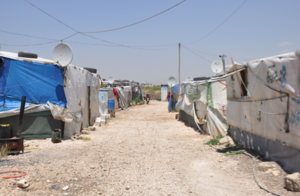
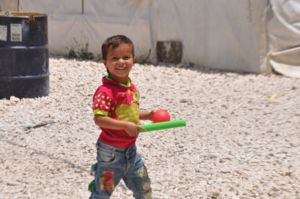
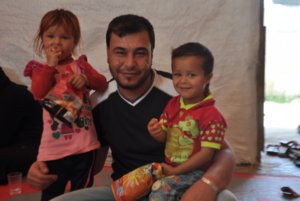
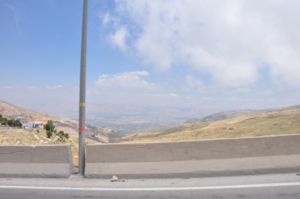
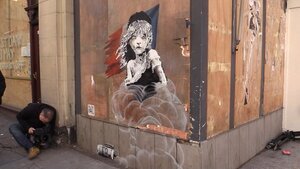


Thanks for doing this and sharing. Shocking conditions for anyone to be in.
+1
The government should be ashamed of its inability to provide for even the small numbers it promised to welcome
+1 It’s not an inability on the Irish governments part, its an unwillingness to do anything. it’s disgraceful.
Here’s a crazy idea or two,
1 Have the Syrian army conscript all males of fighting age and return them home to fight. (You’ll notice most of the migrants in Calais etc are male, having left the women and children to fend for themselves)
2 The US, France, Greece even send an invading force to Syria, wipe out the human smugglers and set up a safe space.
3 Just keep our head in the sand and pretend a swift, violent response won’t sort this out.
You’re right, crazy ideas, not an ounce of sense spoken
That’s all the troll is getting from me
You’re full of ideas about what everyone else should do, what should Ireland do?
We should be a ashamed according to Donal. Cos apparently that helps every situation these days. What a load of crock.
Being ashamed of not following through on your commitments wouldn’t help? I think it’d probably lead to you following through on your commitments.
No. It sounds too much like church to me. The commentariat are forever telling us we should be ashamed- I’m telling them to fupp off. It is a debilitating and crushing thing to wish on anyone and I dont really need your finger wagging moral judgement. Ireland should do more, but not out of shame- out of duty, responsibility, capacity and commitment perhaps. But shame? thats the language of the priest.
It’s attempting to shame the government who’ve failed, not random citizens. I agree with you, but a government that says it’ll do A and doesn’t could do with a bit of a public shaming, it’s the only way things get done in official Ireland
I prefer revolution myself, but everyones too busy.
I said the government should be ashamed, they made the commitment and they have failed to honour it.
Which Syrian army? The ‘official’ one that uses chemical weapons barrel bombs civilians? ISIS? One of the other dozen Islamic fundamentalist sects?
Do you envisage the countries that have taken in male refugees to be a party to this mass enslavement of, it deserves repeating and capitalising, REFUGEES in the army of a genocidal dictator?
If it was my family and my country in tatters, I’m pretty sure they’d send me or my brother to walk 1000’s of km to Europe and expect to follow. I mean I think they would, but perhaps you’re right and they’d send my baby nieces with my granny.
Your ideas aren’t crazy, they’re imbecilic and mean. I think we all feel stupider and kind of sullied for having wasted time reading them.
Well said.
………..you ARE aware that the Syrian army is a lot of who bombed them out of their homes and made them refugees, right? they created the unstable vaccuum for IS to move into. F- on today’s trolling, Eamonn.
reminds me of Lara Marlowe’s stories of Beirut and children with PTSD. there’s a long history between Syria and Lebanon. it’s appalling that they have to pay rent and residency fees. what would they do if they cant, or the manager takes a disliking to them? they’re at his mercy – imagine, for example, a sleazy manager. do they have to sleep in the dirt? starve?
Summary: The Lebanese sit drinking expensive coffee outside nice restaurants while other Muslims live under tents.
We sit and drink expensive coffee while other humans live in tents, while they drown in the sea, while they are killed and sold in sexual slavery. Aren’t we all great?!
nicely fixed
+1.5m
I guess we should be ashamed of ourselves?
No, just you if that’s your take home message
The inability of ” the West ” to set up a no-fly zone within Syria could have something to do with Syrians being found outside Syrias borders.
You think De Wesht should be shooting Russian planes out of the sky?